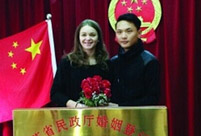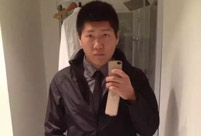

What is happening in Brazil is a great struggle to control the central political power in a period which is not electoral, says Professor José Medeiros da Silva in an interview with People's Daily Online
Professor José Medeiros da Silva
On May 12, the Federal Senate of Brazil decided for the removal of the President Dilma Rousseff. After all the speeches were given, the Senate reached the majority for impeachment, People’s Daily Online interviewed Professor José Medeiros da Silva, PhD in Political Science from the University of São Paulo (Universidade de São Paulo/USP), Professor at the University of International Studies in Zhejiang, Hangzhou, and a researcher invited by the International Institute of Macau. He answered some questions about what is happening in Brazil, the mistakes made by the President Rousseff, and the direction the country might go from now on. Read the interview as follows.
People’s Daily Online: Brazil has been an international highlight lately because of its economic and social roles. Now, the country calls the attention of the world because of a great political crisis. What kind of analysis do you make of this crisis, which resulted in the removal of the President Dilma Rousseff by the Federal Senate?
José Medeiros da Silva: In a very simplified way, we may say that what is happening in Brazil is a great struggle to control the central political power in a period which is not electoral. The results of the elections in 2014 were not accepted by a significant sector of the opposition parties, including some Brazilian entrepreneur segments, groups of the main media companies, and an important part of the medium class in the big urban areas, mainly in the south-southeast axis. The conjunction of these forces and the misguided decisions taken in the first months of the second mandate of President Rousseff resulted in the storm that, now, ended up in her ousting from the presidency. After the elections in 2014, the national and the international political conjectures demanded a person with a more political than technical profile. Maybe for an excess of self-esteem on her own ability for management, President Rousseff was unable to realize the size of the storm growing around her with enough time. She believed the main challenge at the beginning of her second mandate was the economy, but, in fact, it was essentially political. She tried to weaken the political confrontations, which seemed to be inevitable, by bringing them closer, that is, inside the Planalto Palace.
File Photo: Dilma Rousseff
PDO: What do you mean? Why did things reach the point they are now? Why couldn´t the president even have the minimum parliamentary base to avoid the process of impeachment?
José Medeiros da Silva: The president brought economic segments, which used to combat her, to make part of her second mandate. That is, segments which confronted the core of the project of the power of her political basis. It was like taking the wooden horse full of soldiers to Troia. She wanted to build a solid parliamentarian majority so that she could implement the government plan. This is understandable. However, as you said, she could not even assemble a minority, solid enough to avoid this process of impeachment. The reality is usually harder than what we wish. This happened at the beginning of the second mandate, and the consequences of this wrong understanding of the national and international political conjuncture brought this situation about. I guess the president only realized the deep abyss around her when the biggest strategist of her political base, the former president Lula, was called up to depose in a coercive way, on the 3rd of March. President Rousseff, which kept a certain distance of the social base that elected her in the first months of her second mandate, had to back off. But then it was too late. In a war, if you do not prepare yourself well for a back-off process, you take the risk of losing a lot of soldiers and wasting a lot of combat supplies.
PDO: The president could not scale out accordingly to the strength of the opposition. Is it so?
José Medeiros da Silva: Partly, yes. I would say she could not scale out the real opposition to her government project. She only identified the apparent opposition, in the image of the Senator Aécio Neves, PSDB (Brazilian Social Democratic Party), who was beaten by Lula and her in the last four presidential elections. However, this was and has been the most fragile opposition, without a project able of building a larger national unity. She has shown to be an opposition without efficient conductors, who should be capable of applying the economic line of some determined national and international groups. It is an opposition based on political caciques who struggle with each other for personal or very confined projects. Her power now is only muddying the water so that the others can fish. Although this opposition hungers for a big fish, their hook can only fish sardines.
At first, PSDB thought that, with the President Rousseff withdrawal, a new window would open for them to regain the central power. This soon showed to be very illusive, for there is Mr. Temer with all the PMDB (Brazilian Democratic Movement Party) on the way. Not only on the way, but already with a foot in the government. The real opposition was something else. It is made of sectors linked by the mass media and the speculative financial capital. They want to keep hidden for a better defense of their economic interests and to impose their view of the world.
 |
 French girl ties the knot with Chinese boy
French girl ties the knot with Chinese boy Beijing Style: ready for bare legs
Beijing Style: ready for bare legs Century-old station sees railyway evolution
Century-old station sees railyway evolution Enthusiasts perform Kung Fu at Wudang Mountain
Enthusiasts perform Kung Fu at Wudang Mountain Stunning photos of China's fighter jets in drill
Stunning photos of China's fighter jets in drill Monk's mummified body to be made into a gold Buddha statue
Monk's mummified body to be made into a gold Buddha statue Former Chinese solider of the French Foreign Legion seeks wife online
Former Chinese solider of the French Foreign Legion seeks wife online Asia's longest and highest suspension bridge to open to traffic
Asia's longest and highest suspension bridge to open to traffic China's first interactive robot looks like a beauty
China's first interactive robot looks like a beauty Top 20 hottest women in the world in 2014
Top 20 hottest women in the world in 2014 Top 10 hardest languages to learn
Top 10 hardest languages to learn 10 Chinese female stars with most beautiful faces
10 Chinese female stars with most beautiful faces China’s Top 10 Unique Bridges, Highways and Roads
China’s Top 10 Unique Bridges, Highways and Roads EU decision seen harming China ties
EU decision seen harming China ties Society firmly rejects Cultural Revolution
Society firmly rejects Cultural Revolution Villagers living near Vietnam border are still haunted by war’s legacy
Villagers living near Vietnam border are still haunted by war’s legacy As Chinese sci-fi picks up steam, it’s finding fans around the world
As Chinese sci-fi picks up steam, it’s finding fans around the worldDay|Week